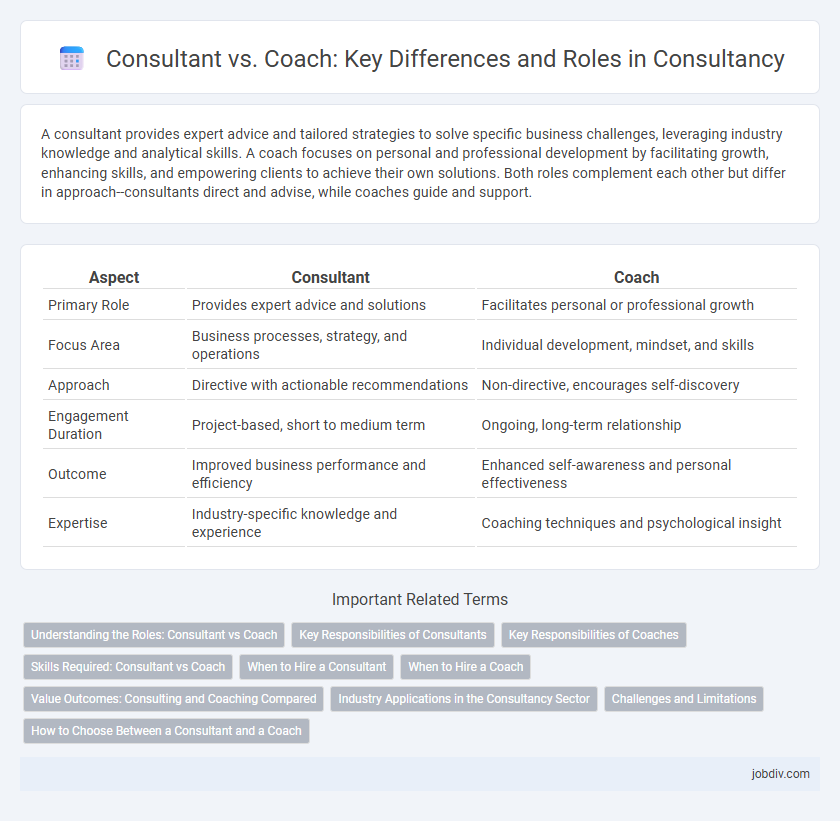A consultant provides expert advice and tailored strategies to solve specific business challenges, leveraging industry knowledge and analytical skills. A coach focuses on personal and professional development by facilitating growth, enhancing skills, and empowering clients to achieve their own solutions. Both roles complement each other but differ in approach--consultants direct and advise, while coaches guide and support.
Table of Comparison
| Aspect | Consultant | Coach |
|---|---|---|
| Primary Role | Provides expert advice and solutions | Facilitates personal or professional growth |
| Focus Area | Business processes, strategy, and operations | Individual development, mindset, and skills |
| Approach | Directive with actionable recommendations | Non-directive, encourages self-discovery |
| Engagement Duration | Project-based, short to medium term | Ongoing, long-term relationship |
| Outcome | Improved business performance and efficiency | Enhanced self-awareness and personal effectiveness |
| Expertise | Industry-specific knowledge and experience | Coaching techniques and psychological insight |
Understanding the Roles: Consultant vs Coach
Consultants provide expert advice and strategic solutions based on industry knowledge and analysis, aiming to address specific business challenges. Coaches facilitate personal and professional growth by guiding clients to unlock their potential, improve skills, and enhance performance through questioning and reflection. Understanding these roles helps organizations determine whether they need targeted expertise from a consultant or developmental support from a coach to achieve their goals.
Key Responsibilities of Consultants
Consultants analyze business challenges, develop strategic solutions, and provide expert advice to improve organizational performance. They conduct thorough research, assess operational processes, and deliver actionable recommendations tailored to client needs. Consultants also support implementation efforts, monitor progress, and ensure sustainable business outcomes.
Key Responsibilities of Coaches
Coaches focus on empowering clients to unlock their potential by facilitating self-discovery, goal-setting, and personal accountability through targeted questioning and active listening techniques. They create tailored development plans that foster behavioral change and skill enhancement, emphasizing the client's growth trajectory and ongoing progress. Unlike consultants who provide expert advice, coaches guide clients to generate their own solutions by strengthening mindset and performance strategies.
Skills Required: Consultant vs Coach
Consultants require strong analytical skills, industry expertise, and problem-solving abilities to diagnose issues and recommend strategic solutions. Coaches emphasize interpersonal skills, active listening, empathy, and motivational techniques to facilitate client growth and behavioral change. Both roles demand excellent communication but differ in their approach: consultants provide expert advice while coaches foster self-discovery and personal development.
When to Hire a Consultant
Hiring a consultant is ideal when your organization requires specialized expertise to solve complex problems, implement strategic initiatives, or optimize processes. Consultants bring data-driven insights and industry-specific knowledge that facilitate informed decision-making and accelerate project delivery. Engaging a consultant is crucial when an external, objective perspective is needed to drive organizational change and achieve measurable business outcomes.
When to Hire a Coach
Hire a coach when your goal is personal or professional development that requires ongoing guidance, accountability, and skill-building, rather than immediate problem-solving or technical expertise. Coaches specialize in unlocking potential, improving leadership, and fostering behavioral change through tailored strategies and support. Choose a coach when you seek growth-driven transformation instead of short-term solutions typically provided by consultants.
Value Outcomes: Consulting and Coaching Compared
Consultants deliver expert advice and actionable strategies to solve specific business challenges, driving measurable improvements in organizational performance and operational efficiency. Coaches focus on enhancing individual skills and leadership capabilities by facilitating self-discovery and goal-setting, leading to sustainable personal and professional growth. The distinct value outcomes lie in consultants providing problem-solving solutions, while coaches cultivate long-term behavioral change and empowerment.
Industry Applications in the Consultancy Sector
Consultants typically analyze complex business problems and provide strategic recommendations tailored to specific industries such as finance, healthcare, or technology. Coaches focus on enhancing individual or team performance by developing leadership skills and personal growth within organizational contexts. Both roles play crucial parts in consultancy, with consultants driving industry-specific solutions and coaches fostering long-term behavioral change and capacity building.
Challenges and Limitations
Consultants often face challenges in addressing deeply ingrained organizational culture and resistance to change, which can limit the effectiveness of prescriptive solutions. Coaches encounter limitations in requiring long-term commitment from clients to achieve personal or professional growth, making quick fixes impractical. Both roles must navigate client expectations and scope constraints to deliver impactful outcomes.
How to Choose Between a Consultant and a Coach
Choosing between a consultant and a coach depends on your organization's immediate needs and long-term goals. Consultants provide expert advice and actionable solutions to specific business challenges, ideal for companies seeking external expertise and quick improvements. Coaches focus on personal development and leadership growth, suitable for individuals or teams aiming to enhance skills and performance over time.
Consultant vs Coach Infographic

 jobdiv.com
jobdiv.com